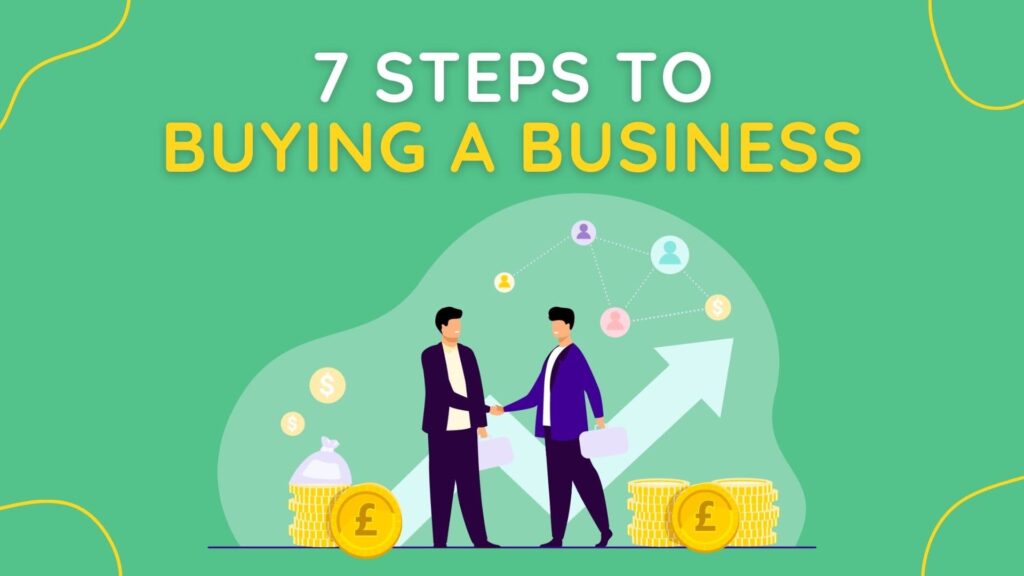
Sammie Ellard-King
I’m Sammie, a money expert and business owner passionate about helping you take control of your wallet. My mission with Up the Gains is to create a safe space to help improve your finances, cut your costs and make you feel good while doing it.

Quickfire Roundup:
If you’ve never heard of the seven steps of buying a business, you’re about to find out all about them!
These seven steps include sourcing small businesses, getting advice, conducting due diligence, getting a valuation, making an offer, negotiating, and completing the deal.
Buying a business is no mean feat, so let’s prepare you for everything you might come up against.
Do you dream of buying a business in the UK? Well, you’re not alone!
But becoming a new business owner can be challenging for both first-time buyers and experienced investors alike.
To ensure you get the best deal (and business!) possible here are a few steps to take to ensure you’re getting the best deal and buying the right business.
Having bought and sold businesses myself I’ve been in your shoes and I always wished I had a guide like this one.
I’ll walk you through the ins and outs of buying a business in the UK. From doing your due diligence to understanding the purchase process from A to Z, my professional advice is designed to help!
Table of Contents
How To Buy a Business
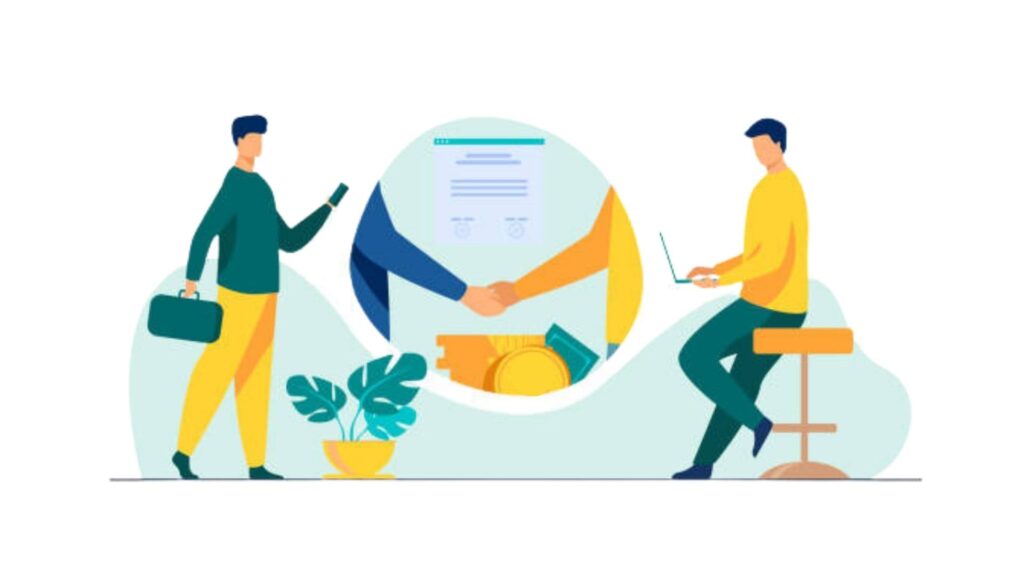
Buying a business can be an exciting and rewarding process. Still, you’ll want to work with an advisor and/or broker to ensure you’re getting the best deal. Generally, the buying process follows the same basic principles.
First, you’ll need to determine your budget and financing options. Then, you can find businesses to buy, conduct thorough due diligence, make an offer (and negotiate the terms), and close the deal.
If your head is spinning, don’t worry! It’s easier than you might think. But let’s start with the basics.
Where can you find businesses to buy?
Buying a business is a big step to take, especially as a young entrepreneur. It may be even more challenging than starting your own small business!
So, knowing where to look for business-buying opportunities is one of the most important tools in your wheelhouse.
One of the first places to look for possible businesses to buy is the internet. There are sites that list businesses for sale as well as franchising opportunities in current businesses.
Besides business broker websites, there are other places you can go and professionals you can speak to that specialise in brokering deals of this nature.
Business brokers, CPAs, attorneys, and current business owners or franchisors will be able to help you obtain the information you need. This will help to ensure you buy a successful business.
Types of businesses people buy
Not every business will be a success, which is why many future business owners carefully consider which industries they want to purchase a business in.
The best businesses for women might also not be the same for the blokes so it’s important to understand what it is you’re looking for and what suits your needs.
There has already been a lot of buying and selling of businesses this year, with the most popular companies people buy being:
Services: People will always need help, and businesses in the industry remain a popular business choice. This includes HVAC/R, commercial and residential plumbing, roofing, electrician and pest control businesses.
Websites: You might not think of a website as a business, but niche websites, eCommerce websites and authority websites function just like a business. Of course, you would need inventory to offer website visitors, but this can easily be done through Amazon FBA.
Food trucks: Budding chefs can purchase food trucks with an existing client base and make it their own by changing the menu or servicing new areas.
Online business: There is no shortage of businesses online. You can find companies that offer virtual assistants, tutoring, content marketing, web design, and consulting. Buying an online business means you will have fewer assets and you’ll be able to reach a wider audience.
Franchise: Purchasing a trusted franchise is a great way to immediately have an established customer base, existing staff that has worked in the franchise before, legal documents and sometimes infrastructure.
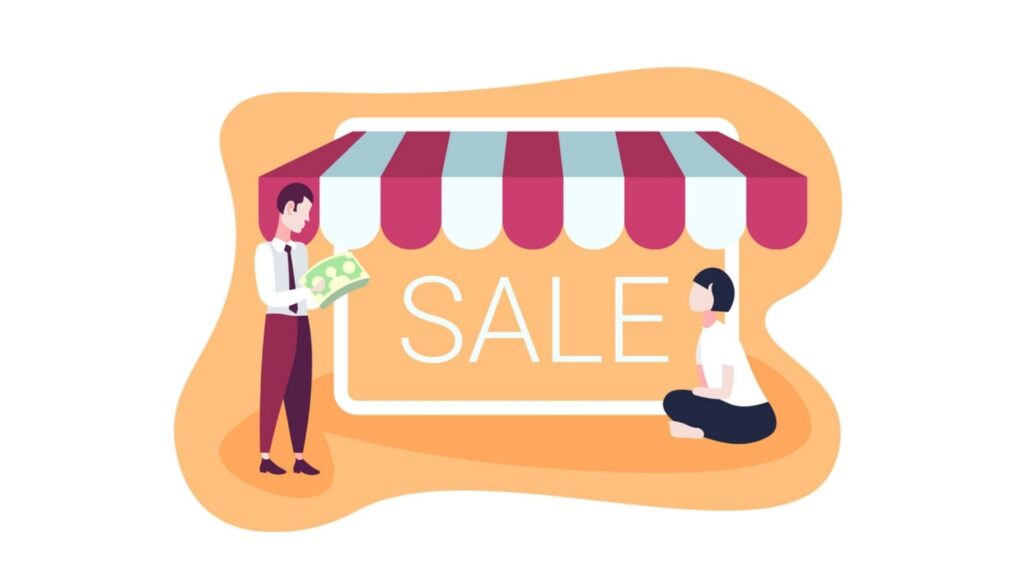
Pros and Cons of Buying a Business
Pros
- The business is already in operation
- Established customer base and reputation
- Existing employees need no training and can provide helpful input
- Expansion is easier than establishing a new business
- Less investment of your personal assets is necessary
- Obtaining loans from finance lenders is easier since the business already has records
Cons
- You’ll need a few months of capital to use as cashflow
- A badly run or neglected business may require a significant reinvestment on your part
- Poor staff standards may mean staff will need to be retrained or replaced
- You may need to honour contracts made by the previous owner
- You’ll need to have a budget for professional fees when acquiring a business
How To Decide On A Business
When you’re deciding on what business to buy, the most important thing to do is to determine how well the business matches your lifestyle, goals and skills. Of course, you may first have a longer list of two or three businesses to compare.
Some neglected businesses require a lot of hard work and capital to get them running optimally. On the other hand, businesses that were well-run will require very little effort on your part.
Deciding on buying a business isn’t only about matching yourself with the right business. It’s also about the sector in which the business operates.
Entering a business sector with little to no knowledge of it can lead to the business failing. This is why it’s extremely important to learn as much as possible about an industry before buying a business that operates within it.
Valuing a Business: What To Look Out For
Once you have narrowed down your search to a few businesses, the next step you need to take is to determine their value. The value of a business depends on quite a few internal and external factors.
You can determine the internal factors with ratios used to assess profitability. These ratios are determined using sales and financial figures.
The external factors you can use to value a business include:
- Industry competitors
- Supplier relationships
- Whether the business is involved in any legal issues
- The business’s history
- Changes in industry standards that may affect business operations
- The reason the owner is selling the business
The 7 Stages of Buying a Business
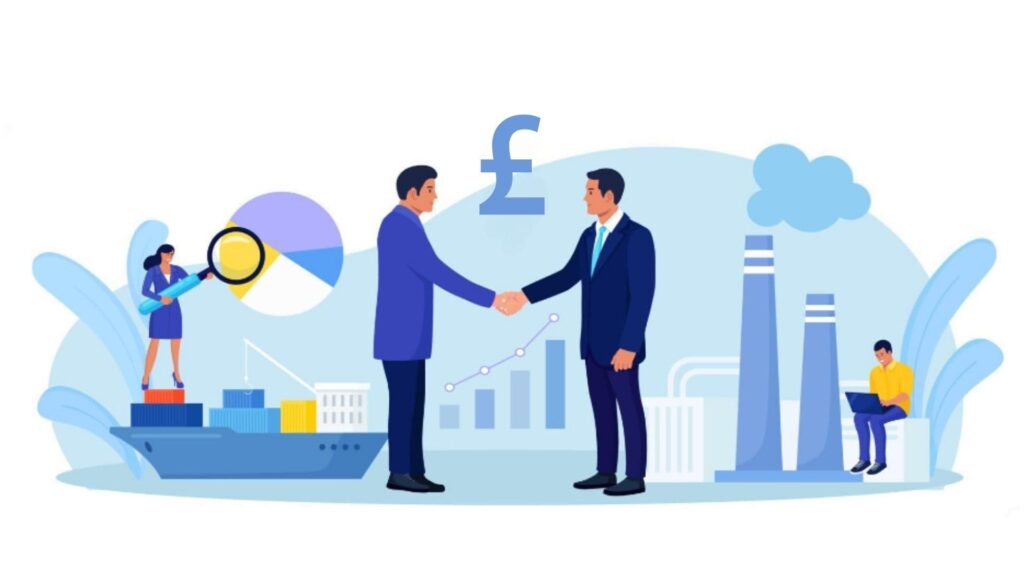
So, you’ve narrowed down your search to two or three businesses and you’re ready to move ahead, but now what?
There are still a few things you need to take care of before you can buy an existing business.
Doing these will ensure you are receiving an operationally sound business for your hard-earned money. In other words, it ensures you are buying the right business.
1. Sourcing
Sourcing is the first thing you’ll need to look at when buying a business. Sourcing is when you look at the business’s current and potential suppliers to determine the best course of action.
It involves negotiating and renegotiating contracts, as well as monitoring the quality of goods and services provided by the suppliers. These will all play a role in your business’s success
2. Advice
Whether you’re a first-time business buyer or a seasoned veteran, getting professional advice is essential.
Accountants and lawyers can provide you with all the information you need as well as the legal requirements of buying a business.
Business brokers are also an excellent avenue to explore. Their main priority is providing advice on buying and selling businesses.
3. Research
It’s important to research the company you want to buy and the industry it’s in. You’ll want to record key findings on each business you’re interested in to use as a reference.
As a business owner, knowing the industry is one of the factors that will determine whether your business will succeed.
Do as much research as you can on competitors, industry standards, and external factors that may influence the business.
4. Valuation
Once you’ve done the research and you’re sure you want to move forward, it’s time to estimate its value. To do this, you can speak to an accountant or lawyer as part of your due diligence.
You should look at the business’s profits, seller’s discretionary earnings, sales, turnover and operations. Also, determine the value of similar competitors and record key findings.
5. Offer
Now that you have determined the value of the company and done your due diligence, it’s time to make an offer.
The first offer you submit should be lower than the business value you have calculated, but not so low that the seller may be offended and refuse to sell entirely.
Your offer should also include any and all conditions you have as you take over the business. These conditions can include:
- The business’s assets are included in the sales agreement
- The seller must stay and continue working for the business for a short time to ensure a smooth transfer
- Contracts, legal bindings and customer-base agreements
- The transfer of property if there is any
6. Negotiation
Negotiation is a common occurrence when it comes to buying and selling businesses. When you submit your first offer, you can expect a counteroffer from the seller.
This will typically include a higher selling price and possibly some alternative sale conditions than those you have stipulated.
This is why your first offer should be lower than you expect to pay. If you aren’t satisfied with the seller’s offer, you can send your own counteroffer.
Business negotiations are about compromise and they will continue until both you and the seller are happy with the agreement and have reached a mutually beneficial compromise.
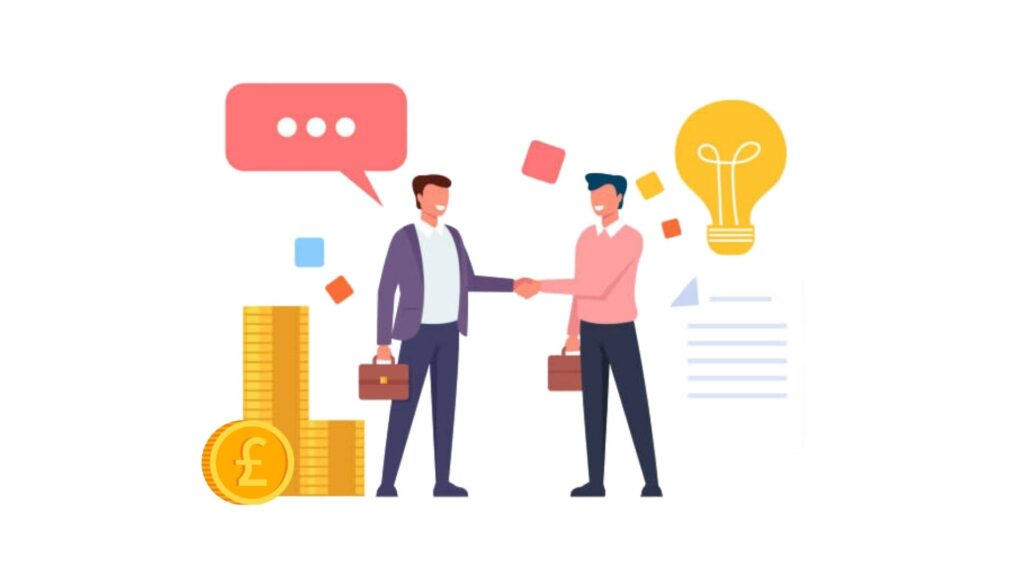
7. Completion
After you and the seller have reached an agreement, there are some final arrangements to be made to complete the sale.
These involve the transfer of all agreed-upon assets, licenses, leases, and contracts. It also includes the finance transfer and financial statements transfer.
Even after negotiating and agreeing on a price and conditions, the purchase could still fail if these procedures aren’t carried out properly.
It’s also important to set boundaries and even a time limit to the proceedings.
Keep things professional and maintain trust, as either party can back out during the buying process as long as the final agreement hasn’t been signed.
FAQs
Can I buy an existing business in the UK?
Yes, it is possible to buy an existing UK business. Buying an existing business is the same as transferring the business from someone else’s name into your own, but with a price tag.
Buying a business in the UK means that your business will have to abide by the UK’s tax and business laws.
So, understanding the laws or having a lawyer that understands them is an excellent idea.
Do you need a solicitor to buy a business?
In some cases, you may need to use a solicitor to buy a business. If you’re buying a business that owns commercial property, you’ll need to hire a commercial property solicitor.
In other cases, having a solicitor to provide legal counsel for financial and legal matters is still a good idea. This is because it’s extremely important to do your legal due diligence.
Solicitors can also help you with leases, contracts and business licenses. Just as a business transfer agent helps owners sell their businesses, a solicitor helps buyers navigate the purchasing process.
Is it a good idea to buy an existing business?
There are many benefits to buying an existing business. It is already operating and functioning.
So, you may not need to put in as much effort, time, money or personal assets in the beginning. Another advantage is that it has a history.
The history of a business can tell you a lot about how it has been run, how well it operates, and what external factors can affect it. This can help you determine trends based on the business’s proven track record.
Obtaining financing is also easier as the finance lenders can examine your business plan with a reference, instead of working with estimates.
Final Thoughts
As a potential new owner, you never want to let anyone pull the wool over your eyes during the buying process. This is why being knowledgeable about how to go about it and doing your due diligence is particularly important.
With this guide to buying an existing business, you’ll have everything you need to succeed. Of course, you may also find some value in these books for small businesses, so be sure to take a look at my blog!
Share on social media
Disclaimer: Content on this page is for informational purposes and does not constitute financial advice. Always do your own research before making a financially related decision.

